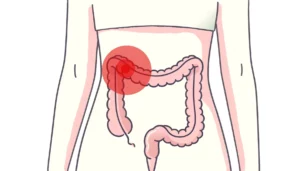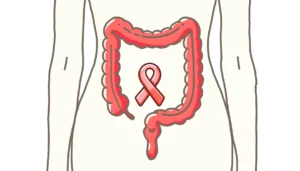
On October 30, 2021, an 83-yr-old woman went to the emergency room for what turned out to be an intestinal obstruction. During the course of investigating that issue it was discovered, by PET scan and blood tests, that she had metastatic breast cancer (MBC) tumors in her lungs, liver, kidneys, spleen, pancreas, gall bladder and bones (spine, ribs, pelvis).
She had had estrogen-dependent breast cancer 11 years earlier, underwent treatment and surgery and was declared cancer-free shortly thereafter. She had regular annual follow-ups from Moffatt Cancer Center and in 2019, she received an “all-clear” report.
Back to the present day, the intestinal obstruction eventually resolved without surgery after almost three weeks of hospitalization, including one week in the ICU. During this time, she had a nasogastric tube draining her stomach and she was not allowed to eat or drink by mouth. Her gastroenterologist did not think she could survive surgery, and explained to her husband and family that it would only be as a last resort that he would perform it.
Because of her metastatic cancer, they restricted glucose in her IVs – giving her only vitamins and minerals – to avoid rapidly “feeding the cancer” throughout her body. At one point before her release, her condition deteriorated such that Last Rites were given. She got better after the obstruction was cleared and she requested to leave the hospital.
The oncologist team provided a dismal prognosis when discussing the options in treating her tumors, essentially that they could not cure the cancer but hoped to prolong her life for an undetermined period of time. She decided against all traditional treatments (chemo/radiation) and was sent home with hospice care. She needed a walker, was weak and required in-home care.
Meanwhile, during her hospitalization, the relatives came across a reference to an experimental treatment called fenbendazole that had a number of amazing anecdotal reports that could best be summarized as, “it worked for me!”
Although people normally would never bother reading about something that seemed so unbelievable, for some reason the relatives decided to investigate whether there was credible science to back up the claims.
An analysis of some of the supporting papers describing the mechanisms through which fenbendazole worked to kill cancer cells was simple and straightforward. Fenbendazole is a veterinary anti-parasite medication primarily used to treat worm infestations in animals.
Fenbendazole (Fenben) selectively disrupts the microtubule transport system within the parasite cell starving it of glucose and killing it. Petrie dish studies (in vivo) of Fenben indicated that it worked within 12 hours, killing human lung cancer cells without harming healthy cells.
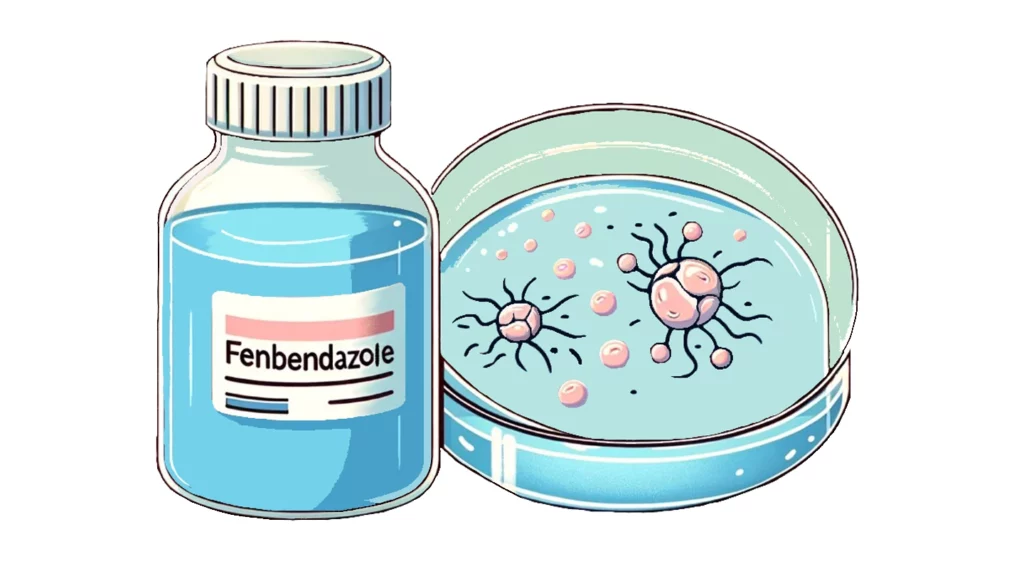
Not only did Fenben appear to eradicate the cancer cells, but it was also selective, killing only cancer cells. This lack of nonspecific toxicity is one reason why fenbendazole appears to have no adverse side effects. The 83 old woman had no side effects.
Because she had intestinal issues and we were concerned about nausea before she took Fenben, the relative took it for 3 days to “see what happens”. Nothing. Then her daughter, 50% genetic match to her mother took it. Nothing, no noticeable adverse effects. So, they were somewhat confident that she would not be sickened by fenbendazole, which was correct.
Below is the original letter of the person who shared this story with us.
*********************************
Fenbendazole (Fenben)
Antiparasitic has been used to treat roundworms, pinworms, etc.
Accidental Discovery (2002) – Johns Hopkins glioblastoma study in which cancer cells implanted into the brains of mice failed to grow tumors in those mice that were recently pretreated with Fenben (to deworm the mice), as a normal course of veterinary care.
The tumors that were supposed to grow as part of the experiment did not; once they contacted the vet and figured out why, the discovery was made. Fenben is extremely safe, always administered orally, no side effects, inexpensive and easy to obtain.
Case Reports of Effectiveness
Cancers of the lung, kidney, liver, breast, prostate, melanoma, bone, ovary, colon and brain (glial cells) all seem to be favourably affected. There have even been reports of effectiveness on pancreatic cancer.
Most of the cases involved spread to other organs (metastatic). Why is this important… It suggests that there is a common vulnerability in the cancer cell that is independent of where the tumor is located.
The Case Reports Seem to Have a Common Theme
Patients go through standard chemo and radiation treatment for their cancer and either the side effects are intolerable, or the cancer persists despite the treatment. The patient learns about Fenbendazole and they have nothing to lose in trying it. Subsequent diagnostic imaging finds reduced or eliminated tumor activity.
How Fenbendazole Works?
It appears to have multiple potential mechanisms to selectively kill cancer cells.
- First is disruption of the microtubule system that the cancer cell needs to survive and replicate.
- Second is disruption of glucose utilization blocking the energy supply to the cancer cell.
- Third is upregulation (increase) of P53 tumor suppressor genes that help kill cancer cells.
- Finally, it looks like fenbendazole also blocks the formation of new blood vessels to the tumor, this will starve and kill it.
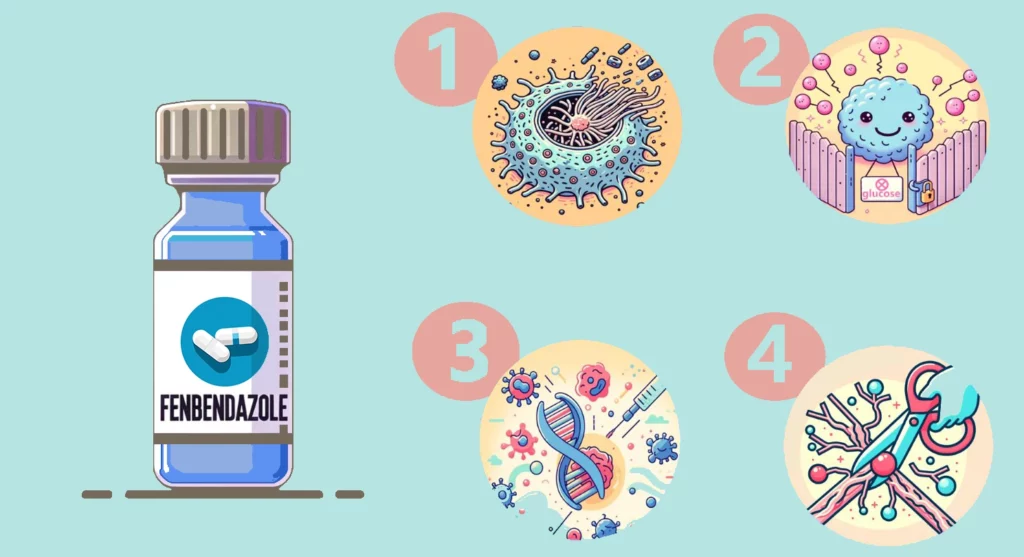
Each one of these mechanisms has been targeted individually by traditional cancer drugs but don’t seem to be as effective as Fenbendazole.
What is amazing about Fenbendazole is that there appears to be a highly selective effect on cancer cells only; healthy cells are not affected or harmed in any measurable way. This is why there are no reported side effects like hair loss, nausea, etc.
Is Fenbendazole Effective by Itself… with No Traditional Chemo or Radiation Cancer Treatment?
There are a few other case reports where people have tried fenbendazole first and that was all that was needed to put their cancer into remission. However, many community members report that fenbendazole does a great job when used along with conventional treatments.
How Long Does it Take to Work, if it does?
Some of the experiments in petri dishes show that within 12 hours of treatment glucose utilization is affected as well as microtubule function of human cancer cells (lung).
The case reports are less specific because they rely on scheduled diagnostic scanning, which is uncontrolled and variable. The consensus seems to be 4 weeks to 3 months is a reasonable time frame to expect results.
However, it is encouraging that Fenben has an almost immediate effect in vitro, 12 hours, which is consistent with its antiparasitic action (the course of treatment to kill roundworms is 3 days).
What is Happening Here?
Nature tends to conserve form and function for efficiency, and it looks like parasites and cancer cells are similar in the following respect: they are both foreign to the host and contain similar structural weaknesses.
The microtubule system in parasites and cancer cells is somehow vulnerable to fenbendazole whereas normal healthy cells are not.
Just like fenbendazole selectively kills the invading (non-self) parasitic worm cells it also selectively kills the invading (non-self) cancer cells while ignoring the healthy cells (self) with their different microtubule structure. No one knows what those differences are, but fortunately there are differences that make fenbendazole work.
What to do?
Week 1: 3 consecutive days FenBen, 4 days off. See how it’s tolerated.
Week 2 – 12: 5 days Fenbendazole weekly, 2 days off.
Week 13: Diagnostic testing.

My relative did not take any other agent suggested by some others to be additive with Fenbendazole (Vitamin E, Curcumin, CBD oil). However, she did continue her usual daily 5000 IU vitamin D supplement plus regular daily vitamin supplement.
Observations: as stated above, she was in dire trouble when released from the hospital. Her voice was weak, and her survival was day-to-day. She started taking Fenbendazole, 222 mg once per day sprinkled on a few tablespoons of yogurt on November 22, 2021.
We were concerned about absorption due to her intestinal issues and overall strength. Fortunately, she appeared to turn the corner within two weeks, in that, her strength, appetite, and appearance all improved, markedly. Within four weeks she was strong and confident enough to be released from hospice. She could walk on her own and was finally gaining weight.
On Dec 28, 2021, she had recovered enough to make a visit to an oncologist meaningful. She still refused traditional chemo and radiation but agreed to injections of fulvestrant (an estrogen receptor blocker), recommended to stop “feeding the cancer”, much as glucose does. She continued to take fenbendazole 5-6 days per week (no specific time period during the day).
On Jan 10, 2022 she received targeted radiation of two tumors in her spine that were causing pain. The tumors rapidly disappeared, relieving the pain within a couple days. There is literature indicating that fenbendazole potentiates traditional chemo and radiation therapies, as happened in her case. Radiologist remarked that the radiation worked extremely fast in her case. Again, anecdotal but relevant.
Near the end of Jan 2022 the consensus of the family was that she was back to her prior self with respect to attitude, appearance and activity. She got back on her bike in early February, quite a change from needing a walker in November.
Blood Tumor Marker CA 27.29
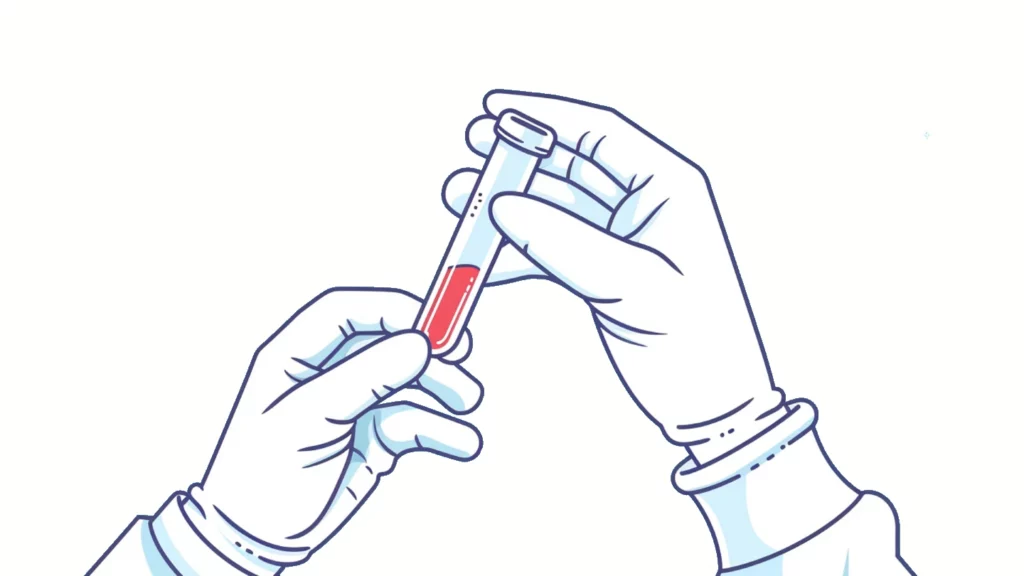
The figure below plots the change in CA 27.29, a blood tumor marker that is specific to metastatic breast cancer (MBC), over time. A reading of over 100 indicates active MBC, while a reading below 38 is normal.
When she left the hospital, her reading was 316 on Nov 22, 2021. There was no measurement until two months later as she was in hospice care and further measurements were deemed irrelevant at that point.
On Jan 20, 2022, CA 27.29 dropped to 131 and continues to drop into the normal range (CA 27.29 measures can lag the elimination of the cancer by up to 3-4 months).
On April 20 she received her second PET scan (first one was in the hospital), which confirmed the absence of any metabolic activity indicative of cancer. These PET scan results corroborated the CA 27.29 data, all of which fit with the observational impression on her appearance and overall well-being described above.
So, we could see that she was getting better, the PET scan and blood tumor markers confirmed what was visually apparent. Again, NO SIDE EFFECTS!
On May 4, 2022 her CA27.29 reading dropped to 47. PET scans detected no abnormal metabolic activity, which means no cancer.
On July 20, 2022 her CA27.29 dropped to 37, which is normal. PET scans continued to detect no abnormal activity. She feels great, looks great and is happy.
Note: Fulvestrant, an estrogen receptor blocker, limits the further growth of estrogen-dependent tumors but typically does not kill them. Fulvestrant typically does not affect blood tumor marker readings.
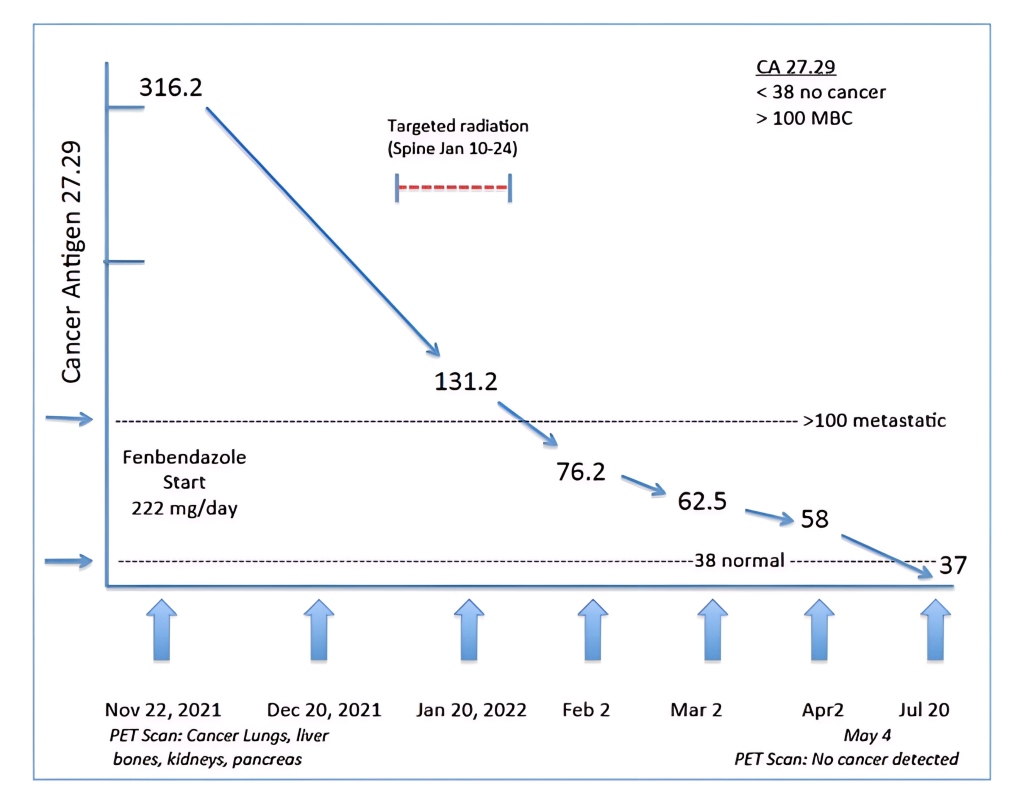
Going Forward
Recently we celebrated her 84th birthday and it was refreshing to get the family together under happy circumstances versus the alternative.
One question going forward is should she continue to take Fenben as a preventative measure? Probably, because she is high risk. Does she need to continue taking it, to keep the cancer from coming back? Don’t know.
July 28, 2022. She stopped taking fenbendazole after 8 months of frequent use. Her cancer is gone. Also, coincident with her taking fulvestrant injections her blood work showed elevated ALT and AST readings indicative of liver malfunction.
We don’t know if the fulvestrant, fenbendazole or an interaction between the two is related to her liver numbers. Stopping fenbendazole, after it has served its purpose, seems to be the wise action to take. She has no symptoms or discomfort related to the ALT and AST readings.
Aug 20, 2022. ALT and AST readings are normal. So whatever changes occurred in her liver panels was temporary. CA 27.29 was 33.3
September 21, 2022. ALT and AST normal. CA 27.29 was 30! Blood tumor marker continues to drop even without taking any Fenbendazole.
Dec 4, 2022. CA 27.29 is 29.9. Taking fenben 222 mg averaging every other day.
Jan 4, 2023. CA 27.29 is 27.9. Taking 222 mg fenben 5 days per week. No side effects noted.
February 1, 2023. CA 27.29 is 27.5. Taking 222 mg fenben three days per week. No side effects.
February 27, 2023. CA 27.29 is 26.8. Taking fenben 222 mg three times per week.
June 2023. No longer considered a “cancer patient.” Out of all the treatments. Monitoring once every 3-6 months.
She appears to have been “cured”. She will continue to monitor her blood tumor marker and should it start to trend up, she plans to restart fenbendazole.
She is fortunate to have an oncologist who is encouraging her to “keep doing what you’re doing” and will provide periodic diagnostic tests to monitor her condition. The fulvestrant injections caused much discomfort and would probably be avoided in the future.
What Fenbendazole to Use and Where to Get It?
Fenbendazole is available without a prescription in pet stores, Walmart and Amazon. It is inexpensive (as of September 12, 2022 PanacurC was $7.99 for 3 packets of 222 mg; the 25g bulk bottle was $48 equating to a 43 cents per day dose over the 112 days the 25 g will cover. We’ve used fenbendazole in two forms.
First was the individual packets with the dog on the label. Simply sprinkle the entire single packet on a tablespoon of yogurt or ice cream.
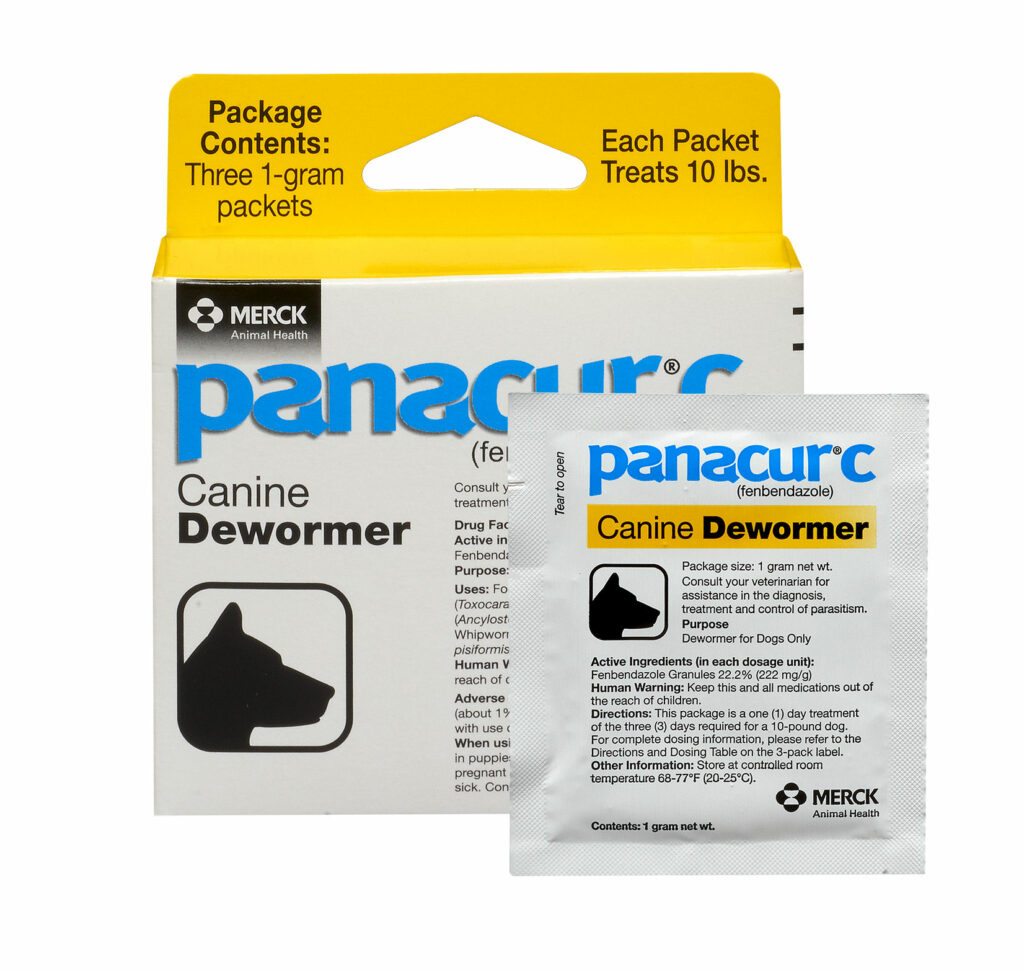
Then we used the bulk powder, which includes a simple-to-use 222 mg measuring spoon. Both seem equally effective in our hands.
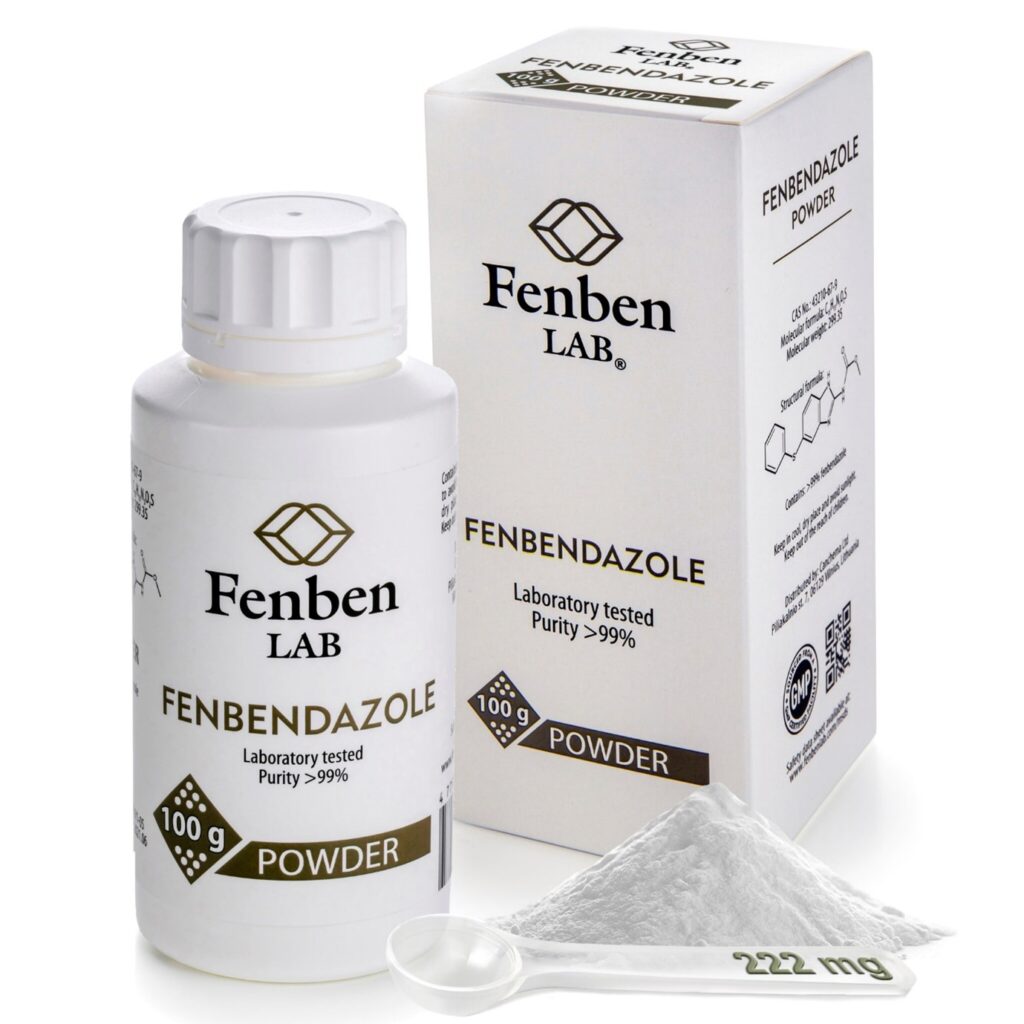
Summary
83 year old female with metastatic breast cancer in lungs, liver, kidneys, spleen, pancreas, gall bladder and bones (spine, ribs, pelvis). Refused traditional chemotherapy and radiation.
Took fenbendazole 222 mg 5 times per week for 8 months. Added targeted spot radiation of two tumors on spine causing pain.
Cancer-free by two corroborating measures: serum CA 27.29 tumor marker and PET scan. Fenbendazole was without adverse side effects. Monthly monitoring of CA 27.29 to guide future use of fenbendazole.
Going forward: in the upcoming issues we will present other case studies of people who have used fenbendazole to treat their own cancers.
Melanoma, colon, pancreatic, lung and esophogeal are the cancers that are due up in the next few issues. In the meantime, please share this publication anywhere you see fit as well as with those you think could benefit.

